Rhapsody in Blue (1945)
“I don’t want to be just a concert pianist… I want to use the piano as a stepping stone!”
|
Synopsis: |
|
Genres, Themes, Actors, and Directors:
Review: With that said, those willing to forego historical accuracy in favor of a fabulous aural tour through Gershwin’s brief but luminous career won’t be disappointed. Rhapsody in Blue is jam-packed with Gershwin tunes, including a nearly full-length rendition of the title song itself (a fabulous sequence), and cameos by several well-known performers, including Hazel Scott, Anne Brown, and Al Jolson. The acting performances are all fine as well: Robert Alda (Alan’s dad) effectively portrays Gershwin’s drive to achieve at an early age (eerily foreshadowing his premature death), and it’s great fun to see Oscar Levant playing an extended cameo as himself — in one particularly amusing shot, he’s seen anxiously watching Alda-as-Gershwin “performing” “Rhapsody in Blue”, when it’s actually his playing we’re hearing dubbed. Rhapsody in Blue may not reveal much about who Gershwin really was as a person, but it does a stellar job evoking the magic and beauty of his inimitable musical style; for this reason alone, it’s worth a look. Redeeming Qualities and Moments:
Must See? Links: |
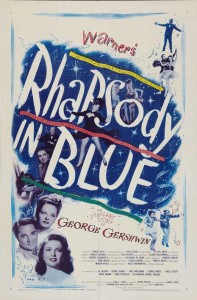
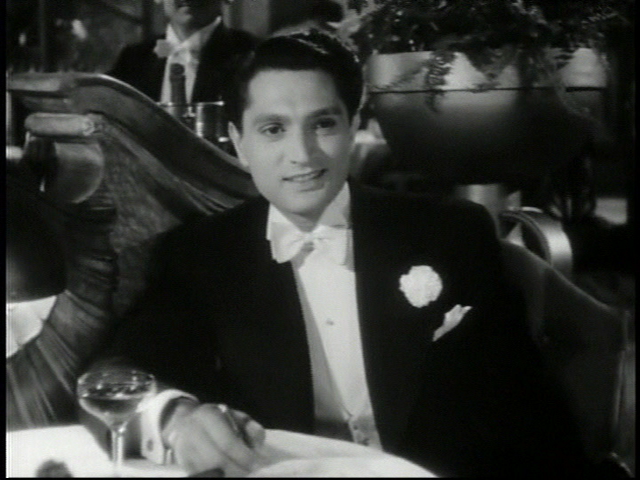
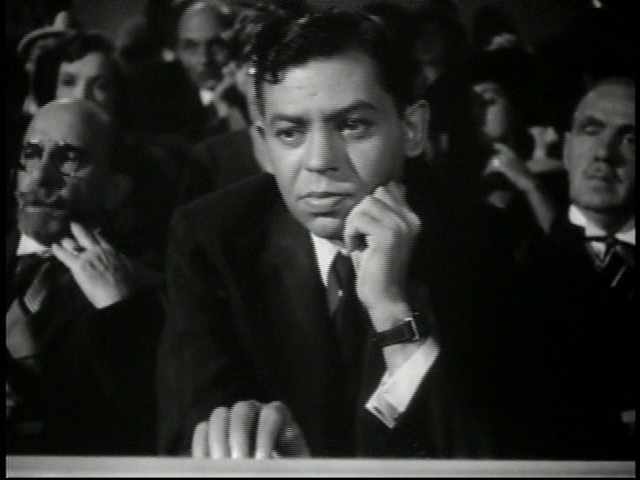
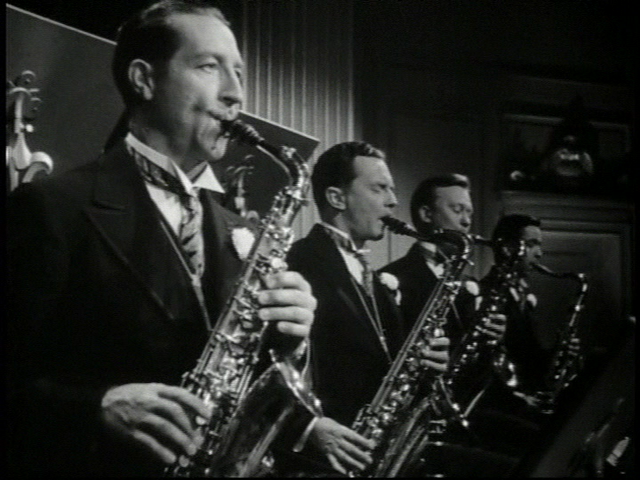
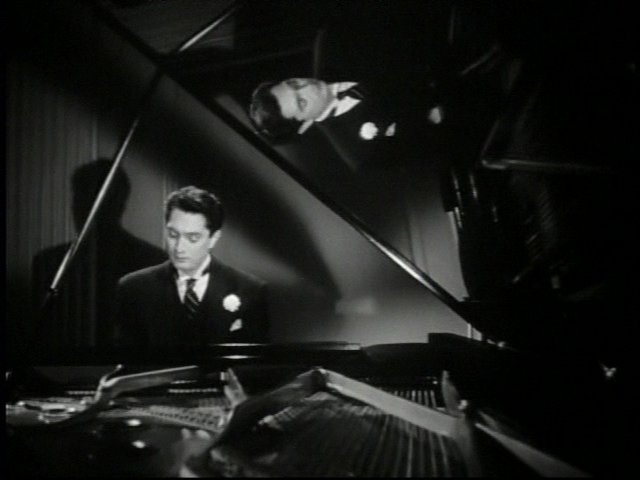
One thought on “Rhapsody in Blue (1945)”
A once-must, as a ‘biopic’ mostly successful thanks to its grand Hollywood style; also noteworthy as a rich homage to the visionary American composer.
Whenever I watch a film of the ‘life story’ of a music artist, I tend to consult my friend Gary – who seems (to me, anyway) to know just about everything about every major composer. So while watching ‘RIB’, I emailed him to ask how much truth is in the film. He said, “Some yes, and some no and NO in a big way. The original script that was submitted and rejected was, with some modification, made into ‘Humoresque’. There was no ‘Julie’ – his great love was Paulette Goddard, no Prof. Franck, no Alexis Smith and – according to Irving Caesar, who wrote the lyrics to ‘Swanee’ – he was bisexual and it was a known ‘secret’ on Broadway. When he did substitute as pianist for Chico Marx, it would have been for Leonard Marx. His mother didn’t like that they were portrayed as poor and said that they weren’t and always had a maid.”
If, as Mr. Crowther remarked, we see no “dramatic continuity to [Gershwin’s] life”, that’s largely because that’s not what the film sets out to accomplish. The focus is clearly on the composer’s music – and, joyously, there’s lots of it! Some of it is delivered with satisfying musical stagings. And, in the case of ‘An American in Paris’, the viewer is treated to a lovely visual collage of Paris itself.
The script suggests that, for Gershwin, his life – to a considerable degree – *was* his music. He lived at a critical moment in music history and was uniquely responsible for modernizing possibilities of style. In that sense, there’s a certain similarity between Gershwin and the modern composer Stephen Sondheim. (Sondheim is certainly singular for stretching the possibilities of the modern musical – and, like Gershwin, there is no one like him.) Although he has recently published two volumes that detail his work process, Sondheim has stated that the reason he has no interest in writing an actual autobiography is that he doesn’t feel he has lived an interesting life outside of his work. In a way, ‘Rhapsody in Blue’ takes the same view of Gershwin. The film is much less about the man than it is about what he (thankfully) gave us.
Director Rapper (who had just directed two fine Bette Davis films – ‘Now, Voyager’ and ‘The Corn is Green’ – and would reunite with Davis following ‘RIB’ for another film about musicians – the vastly underrated ‘Deception’) reveals here a solid understanding of filmmaking in traditional Hollywood terms. Overall, his film flows economically and always with taste and sensitivity.
The only real drawback to ‘RIB’ is the subplot involving Smith – not so much because it’s blatantly fictional, but because it’s simply not that interesting and drags the film down while it’s there. Fortunately (though through no fault of the actress) the character leaves just in time. As for Gary’s remark about ‘Julie’…even if she didn’t exist as written, Leslie does seem to have a Paulette Goddard quality to her, so that element is at least believable. And as for Levant…I’ve always had a bit of difficulty watching him act (basically with the exception of his atypical, upbeat performance in ‘The Band Wagon’). It’s well-documented by Levant himself that he was not a well man (to quote him, “There’s a fine line between genius and insanity. I have erased this line.”) but, in a performance like the one here (and, yes, he is playing himself), his persona grates. (One interesting point about the Gershwin-Levant friendship: Gershwin was always a better composer than pianist; Levant was thought the opposite, and considered the best interpreter of Gershwin’s work.)
Special mention among the supporting players: Morris Carnovsky as Papa Gershwin, Herbert Rudley as Ira & Julie Bishop as Ira’s wife Lee.